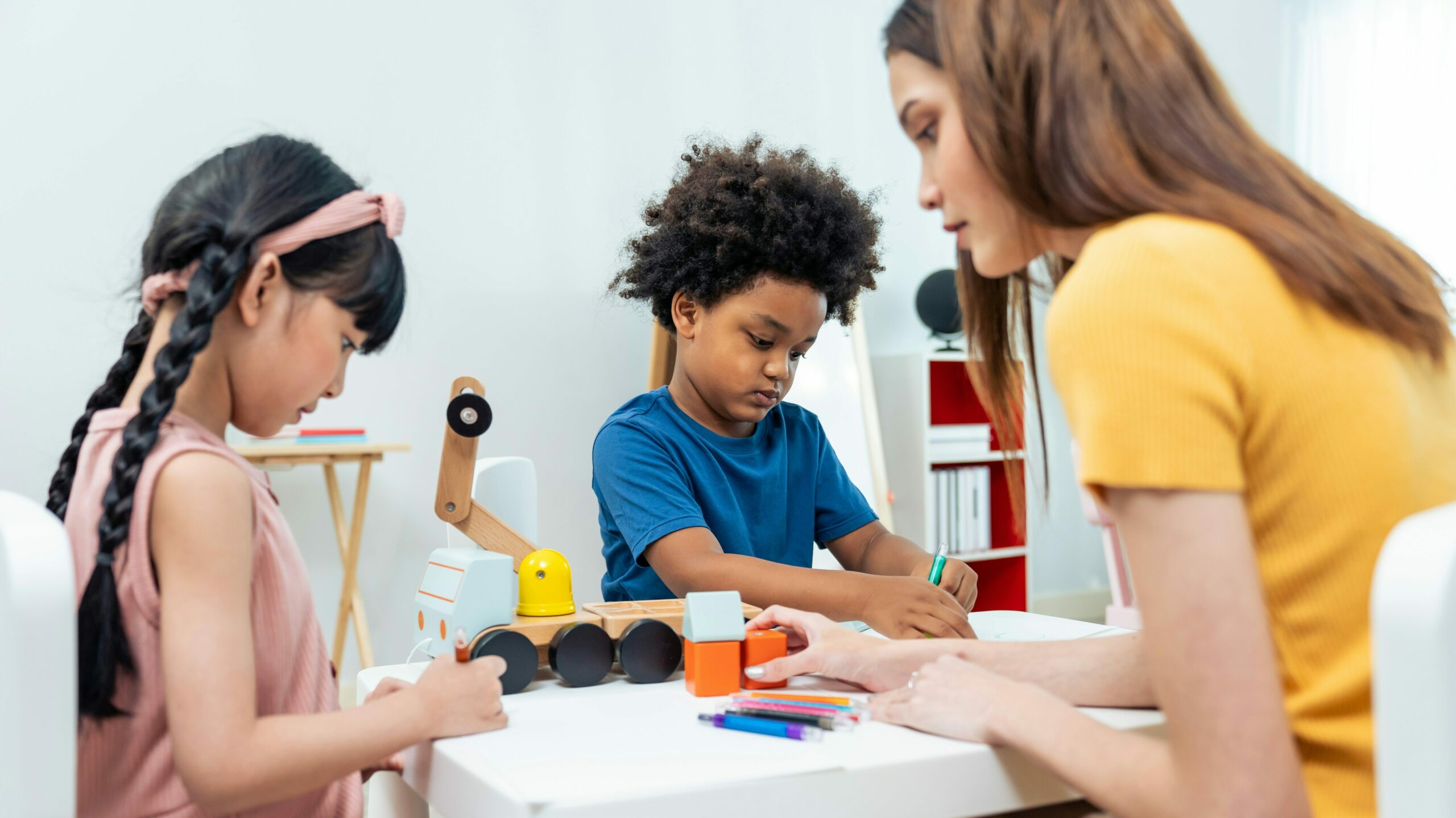For parents across New York who notice signs of unusual behavior or developing disabilities in their children, children’s HCBS (home-and-community-based services) offer a lifeline. This year, RevCore — a trusted leader in mental health and substance use disorder treatment — proudly launched our own children’s HCBS program, called Kids Core.
Kids with emotional and behavioral difficulties will find a compassionate resource to help them navigate school and social environments with more ease and less stress. And overwhelmed parents can find comprehensive support, ranging from clinical treatment to caregiver services and family advocacy.
What motivated this expansion in RevCore’s offerings? What sets RevCore’s approach apart? How does Kids Core ensure each child’s success? We sat down with Program Director Morris Sarju to shed light on all this and more.

Q: Many people know RevCore as a trusted provider of behavioral health and substance use treatment across New York City. In 2024, you’ve also become a designated Children’s HCBS (Home and Community Based Services) provider. What motivated this expansion of services into Children’s HCBS?
The idea of bringing children’s services to RevCore was really a natural next step for us. When we first started out, we had our substance abuse clinic. We quickly realized that substance abuse often goes hand-in-hand with mental health issues. That’s when we opened up our own Article 31 Clinic, but that’s only for adults 18 and over.
That’s when we realized if we can get to these kids earlier, teach them some important skills, we might be able to prevent substance misuse or keep their mental health from getting worse down the line. That’s what HCBS services are all about – early intervention, and prevention, for children under 21 and their families.
We’ve seen firsthand in our clinics what can happen when these issues aren’t addressed early on. So, by expanding into children’s HCBS, we’re hoping to get to these kids before they end up facing the same challenges we see in our adult clinics.
It’s all about getting in there early, providing support, and hopefully setting these kids up for a healthier future.
Q: For anyone who may not know, what exactly are children’s HCBS services? What do they do, and for whom?
First and foremost, it’s an early preventative program. It’s designed to work with children aged under 21 who may be at risk of being removed from the community — whether that’s because of an emotional or developmental disability, or a medical fragility — and prevent it from developing into something where treatment may be needed.
This takes place either at home or in the child’s community. And that’s a huge benefit because it lets kids learn skills in the same environment where they will use those skills. Because if children learn coping skills in a hospital or institutional setting, it can be tough for them to translate those skills back into their everyday life once they’re discharged. So we work with these kids right in their own spaces. This makes it a lot easier for them to put them into practice and maintain their progress. It can also give better access to healthcare and make it easier for parents to keep working.
Ultimately, the goal is to prevent them from being removed from their community because of their behaviors or disability that makes it hard for them to function.
At RevCore, our particular children’s HCBS services include:
- Prevocational Services: We help kids develop the skills they need to prepare for future employment. For example, following directions, task completion, and problem-solving.
- Palliative Care/Expressive Therapy: For children with life-threatening or life-limiting conditions, we offer therapies to improve their quality of life, manage symptoms, and provide emotional support.
- Caregiver/Family Advocacy and Support Service: We work with caregivers and families to provide training, advocacy, and support to help them better understand and meet the needs of their child.
- Planned Respite: We provide short-term relief for caregivers, giving them a break while ensuring their child continues to receive quality care.
Each of these services is tailored to the unique needs of the child and family, and delivered in a way that’s most comfortable and effective for them.

Q: And for anyone who may not know, what are the particular benefits of an HCBS program?
One of the really great things about HCBS is that you get to work with the entire family unit. That doesn’t mean they’re always interested in participating, but the option is there. And that’s a really unique dynamic that we don’t always get to experience in other settings.
Another huge benefit, as I already mentioned, is we’re working with the kids in their own environment. This not only helps the child integrate the skills better, but can help us make more progress too. When they come to see us at the clinic, they’re in our space. We don’t always get to see the little nuances of their behavior in their everyday life.
But with HCBS, we can observe how they interact with their family, with other adults, and in different situations in their community. That’s something I’m always excited about – being able to work with the kids and their families and getting a real sense of what’s going on in their lives.
And of course, this means we’re also able to notice if the rest of the family has any struggles. We provide a lot of support to them as well — whether that’s clinical services, respite, or advocacy.
Q: What makes RevCore’s HCBS services for children unique from others?
What really sets us apart at RevCore is that we’re bringing a more clinical perspective to our HCBS services. Now, it’s important to note that, based on state guidelines, HCBS services aren’t clinical – they’re preventative. We’re teaching kids daily living skills and how to stay in their community. We’re not intended to be therapists, digging deep into feelings and emotions.
But at RevCore, our staff are trained clinicians. So even though we’re not providing a clinical service per se, we have those skills in our back pocket. We can use them when they’re helpful to anticipate what might be coming down the line for these kids.
This is different from the standard at most other agencies, because they often hire individuals who don’t necessarily have a background in this field. For HCBS services, you don’t technically need a master’s or even a bachelor’s degree – you could start right out of high school. So many provider’s staff are learning and training on the job.
But at RevCore, our staff come in already trained. They continue to get clinical supervision, but on a different level. It’s a real advantage, and it allows us to provide a higher level of support to these kids and families.
Q: How does RevCore integrate its behavioral health and substance use treatment expertise into the children’s HCBS program?
So, let me give you a real-life example. Right now, we have a client in our children’s HCBS program who’s dealing with substance use issues. The RevCore provider working with this client has a background in substance use treatment, so they can have informed, supportive conversations with the client about their struggles.
It’s not about providing therapy or acting as a substance use clinician – as I mentioned already, that’s not the role of HCBS. But having that understanding allows the provider to be there for the client in a more meaningful way. They can offer support, empathy, and resources that comes from a place of genuine understanding.
The same goes for our clinicians who have expertise in mental health. If they’re working with a client who has depression, for example, they bring that knowledge to the table. Again, they’re not trying to be the client’s therapist, but they can interact with the client in a way that shows they get what the client is going through.

Q: What approach does RevCore take in matching the workers to the children?
At some other providers, they take a pretty straightforward approach to matching. If they have a worker in Brooklyn and a client in Brooklyn, they’ll just say, “Hey, this is your worker.”
But for us at RevCore, it’s all about creating a peer service, where the worker has a real cultural understanding of the client and can truly relate to the child. And when we say “cultural understanding,” we don’t necessarily mean someone of the exact same cultural background. It’s more about understanding and appreciating the client’s culture, being someone who gets who they are. We want our families to know that we’re not here to judge them, because we’ve been there. We’re familiar with what they’re going through, and we understand.
This is so crucial when we’re working with kids. Children especially feed off of someone’s energy. If there’s not a good match, if the child doesn’t have a rapport with the worker, it’s going to be tough. Maybe the kid just doesn’t click with the person, or something happens that breaks that connection.
And we need to build a strong rapport, because learning these behavioral health and therapeutic skills takes time. So when we have a worker who can truly understand a family, who can match their energy and vibe, it makes a world of difference. The family wants to get to know them. They start to let their walls down.
Q: How does RevCore tailor its services to meet the specific needs of each child and family?
At the heart of our HCBS services is a person-centered approach. What that means is we really work hand-in-hand with each family to tailor our services to their needs and preferences. If they want to have sessions at home, or if they prefer to meet outside, we can do that. The family is in the driver’s seat, telling us what works best for them.
This starts from the very first step, as soon as we get a referral. I’ll call the family and we start diving into what they’re looking for from us. What do they want to learn? What are their biggest concerns? We make sure they’re involved in creating their own treatment and service plans from day one.
And the family continues to have a say in everything throughout the entire service process. They can tell us, “I want to work with this person,” or “I don’t think this person is a good fit.” They can come to us at any point and say, “Hey, this isn’t quite working out,” or “I think we need to adjust this goal.” It’s a freedom of choice program. Obviously, we have to look at things from a clinical perspective too, to make sure that constantly changing goals won’t negatively impact the child. But at the end of the day, we’re here to work with what the family is asking for. And then we shape that to fit within the state guidelines.
Q: How do you measure successful outcomes in families who have participated in RevCore’s HCBS program?
Measuring success in our HCBS program is all about looking at the progress families are making towards their goals. When we’re working with children, especially those with complex mental health diagnoses, progress can sometimes be hard to see. Teaching new skills might not show immediate results within the six months that we typically get approved for.
So for us, success is often in the engagement process itself. If we have a family that’s willing to participate and meet us halfway, that’s a win in our book.
Because we’re not with these families 24/7. The skills and strategies we teach during our sessions are meant to be reinforced at home, even when we’re not there. We need the family’s input and involvement to make that happen. So when we see families actively participating, reviewing the goals and practicing the skills on their own time, that’s a huge success.
And when we have strong family participation, success becomes a lot easier to measure. The progress is more rapid, more evident.
Q: Looking ahead, what are your goals for expanding or improving RevCore’s Children’s HCBS in the future?
Well, what’s really exciting is that children’s HCBS are a really new part of RevCore, but it’s growing, and growing fast! We’ve been working hard to make sure we have staff available in every borough. We’re ready to take on new clients and provide the support they need.
At the same time, we’re also constantly tuning in to what our clients need and thinking about how we can adapt our programs in the future to meet those needs. It’s an ongoing process of listening, learning, and evolving.
Q: For any parents or Care Managers who would like to learn more, how can they get in touch?
If you’d like to learn more or make a referral, please don’t hesitate to call or email me directly at chcbs@revcorerecovery.com or 718.514.6007. You can also read about the program on our Kids Core website.
If you’re a provider who’d like to know more so you can refer your clients, I’d be happy to come by your office or set up a virtual meeting to introduce our services in more detail, and answer any questions you might have.
